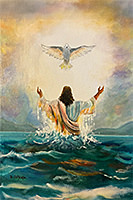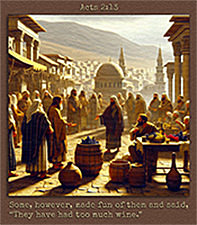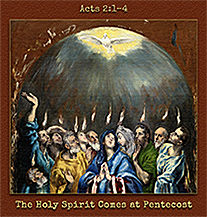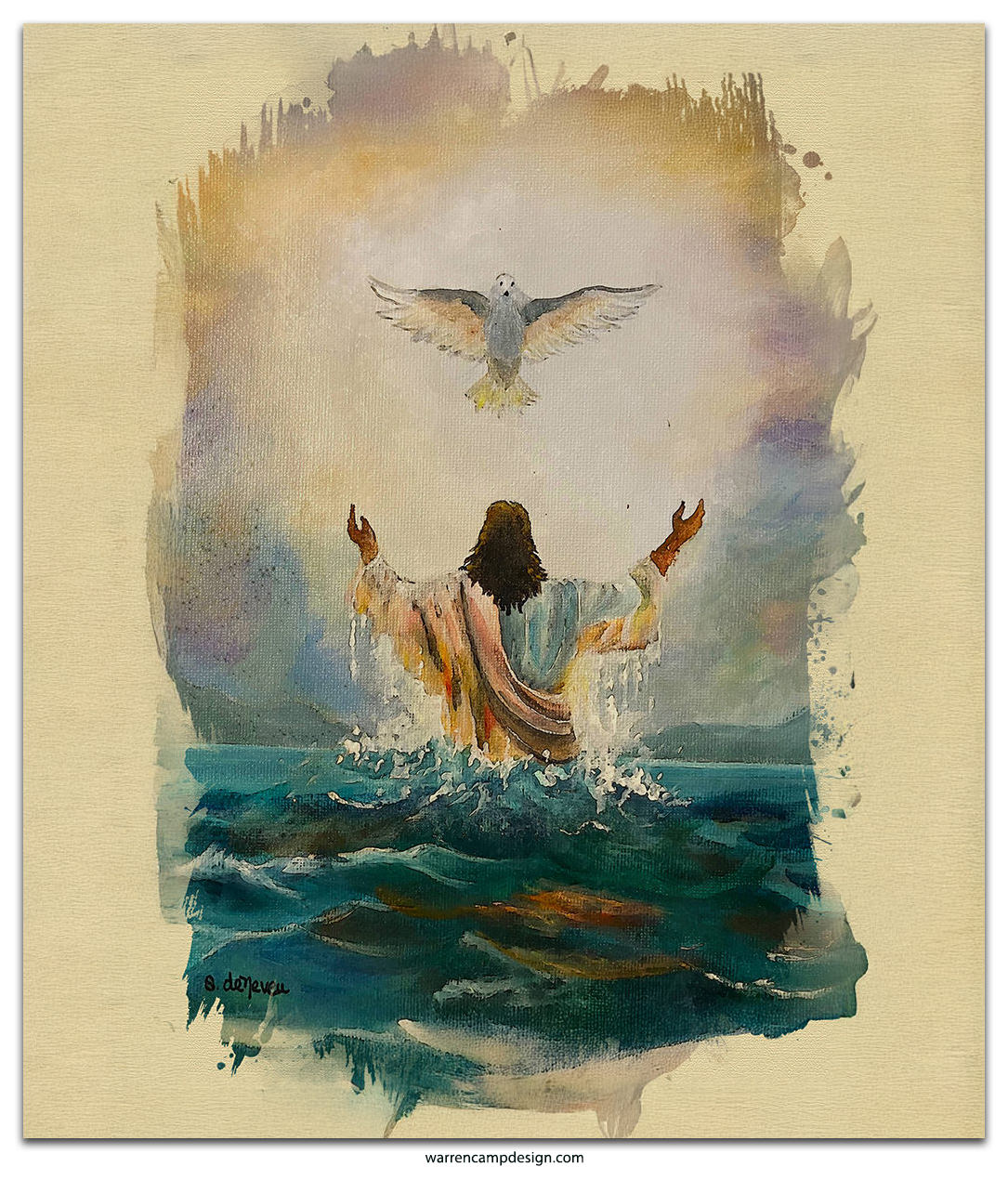
Acts 2:1–13 . . .
“Pentecost: When the Spirit Was Poured Out on the Church”
As Luke wrote chapter 1 to serve as an introduction to his Acts volume, as well as an introduction to Pentecost, Acts 2:1, Luke sets the scene for Pentecost, albeit providing only a brief description. The Day of Pentecost was a Jewish feast held fifty days after Passover. It was a time to celebrate the firstfruits of the harvest. Jewish tradition taught that Pentecost commemorated the day when the Law was given to Israel. The Jews sometimes called Pentecost “Joy of the Law.” So on the Old Testament Day of Pentecost, Israel received the Law, while on the New Testament Day of Pentecost, the Church received the Spirit of Grace in fullness.
Luke also informs readers that Pentecost isn’t an event that was been brought about by the apostles and other believers, but happened as a result of the sovereign activity of God. The Feast of Pentecost didn’t “just happen” on Pentecost; it happened on Pentecost to fulfill its eternally determined, divine destiny.
[Note: Find and read today’s Scripture near the bottom of this page.]
Today we’ll first explore what happened at Pentecost, as written in vv. 1–4, considering also who’d experienced the “outpouring of the Spirit” and who’d witnessed it. Then we’ll turn our attention to the meaning of Pentecost as Peter explained it in his first sermon. Finally, we’ll briefly consider the broader meaning of this event to Luke’s first readers, as well as to those of us here today.
To begin with, the context is clearly “Jewish” in chapter 2: The events took place in Jerusalem; the apostles were all Jews (Galileans, too); Peter’s message was rooted in Old Testament prophecies given to Israel, speaking of God’s coming judgment on Israel, and calling on the men of Israel to repent, offering not only forgiveness of sins and the gift of the Holy Spirit, but the kingdom as well. Note that Luke’s emphasis is not on the spectacular, supernatural phenomenon of the sound of a rushing wind, or the imagery of tongues, but on the meaning of the phenomenon.
Acts 2 presents the church’s birth empowered by the Holy Spirit, centered on Jesus, risen and exalted.
The Holy Spirit Comes at Pentecost | Peter Addresses the Crowd (ch. 2)
› Watch BibleProject’s superb animated video (2 min.) that highlights Luke’s account of the growing multi-ethnic Church.
The Spirit Arrives (2:2–4)
… by Jan van ’t Hoff at GospelImages
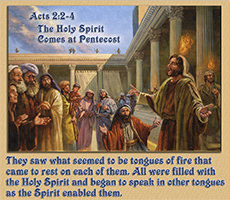
Click to enlarge and download this image of
“Pentecost: Outpouring of the Holy Spirit”
Acts 2:2–4.
The brevity of this account is worth noting. There’s no emphasis on “the sensational”; no lengthy or embellished description of “the unusual phenomenon”; nothing is said about how those on whom the Spirit descended had felt. That emphasis fell on those who witnessed this event and partook of the proclamation of the gospel. Put differently, the spectacular events weren’t primarily for the benefit of the believers but for the edification of those spectators who’d witnessed this miraculous moment. Note that the disciples were “sitting” (v. 2) as this took place, indicating their passivity as it happened.
In addition to the brevity of this account, take note of its uniqueness. Nothing like this has ever happened before. While a few similar incidents are described later in Acts, only here do we read of the “sound of a violent wind” and the appearance of something like “tongues of fire that separated and came to rest on each of them” (v. 3). Only here is there a large gathering of devout Jews from various parts of the world. And only here do the spectators hear the praises of God in their own mother tongue. However, Luke clearly indicates that there wasn't literally a wind or a fire; it was a very loud sound — something like a violent wind — and was something like tongues made of fire. But it was neither wind nor fire literally, so far as Luke informs us.
Seemingly, the sound like a violent wind signaled the descent of the Spirit in a mighty way. Luke is careful to inform us that the sound like a mighty rushing wind came from heaven. In Luke’s gospel account of the baptism of our Lord, he told us carefully that “heaven was opened” (Luke 3:2b). The inference is clear that the dove that descended had come from heaven, to rest and abide on the Lord Jesus. So, too, the words of the Father came from heaven. All of this was to make it quite plain that what happened at our Lord’s baptism and what happened at Pentecost originated with God.
Throughout the Old Testament, fire is frequently a symbol of God’s presence and a means of divine judgment. The human tongue is a reflection of what’s in our hearts. So, apart from divine intervention, the human tongue is a destructive fire, but once the heart is renewed and the Spirit empowers the tongue, it becomes an instrument of salvation (as depicted in the video that’s linked beneath this summary). Thus, tongues of fire seem to symbolize the tongues of the apostles, empowered by the Spirit, which spoke of the glory of God and led to the conversion of thousands of Jews.
Have you tried to picture mentally what must have taken place at Pentecost? The awesome noise (like a violent wind) attracted the crowds who’d heard those who’d been empowered by the Spirit, speaking in a variety of foreign languages. Interestingly, the “tongues” spoken here are languages that were unknown to the speakers but were the native languages of the hearers! What a wonder that must have been for both speaker and hearer.
The Astounded Spectators Respond (vv. 5–13)
It’s wise to take note of the emphasis Luke gives to the audience and its response. This section (vv. 5–13) is considerably larger than the setting (v. 1) and the spectacular phenomenon (vv. 2–4). Peter’s interpretation of these things, contained in his sermon (vv. 14–36, that we’ll cover in this summary), is even larger. All this is an indication of where Luke wanted to place the essential emphasis.
Do you wonder from where those “devout Jews” came? And where were they before this? Some of them were probably devout Jews who made their way from distant lands to come to Jerusalem to observe the Feast of Pentecost (20:16). Perhaps some came for Passover and stayed until Pentecost. Likely, too, this was a period of great messianic expectation. The disciples kept pressing Jesus about how soon the kingdom of God would be inaugurated (see Luke 21:5–7; Acts 1:6). Others, as well, must have sensed that the time was nearing. Perhaps there were many who, sensing that that kingdom was near, determined to be in Jerusalem where such an occasion would likely commence.
Messianic expectation was then at an all-time high. Word about Jesus had spread abroad. Surely the “devout Jews” heard of such things; just as surely, they’d have made every effort to relocate to Jerusalem, hoping to be on hand when the kingdom of God was inaugurated. Here, the response of the audience was mixed. The devout Jews sensed that there was spiritual significance to these events and they sought to know what it was: “What does this mean?” (v. 12). But other spectators dismissed these miraculous events as babblings of drunkards: “They have had too much wine!” (v. 13, enlarge photo).
Concluding Considerations
Let’s make the effort to consider what Pentecost meant then and means to us today. In next week’s study of vv. 14–36, Peter will explain the meaning of Pentecost for those who witnessed it, namely folks who needed to place their trust in Jesus as the promised Messiah. But Luke wrote the book of Acts for us, many of whom have begun to trust in Jesus. What’s the meaning of Pentecost for you?
This week’s and next week’s coverage of Acts 2 must be interpreted as a special historical event, signifying a new period in God’s dealings with his people. Pentecost signaled the dawning of the age of the Holy Spirit. The fullness of the Spirit in God’s people, then and today, is to empower us to witness to all the nations. For each of us, the point of Pentecost is “mission”; and the goal of mission is that “the earth will be filled with the knowledge of the glory of the Lord.” If we properly understand this great historic event, our hearts will become fired up to encourage people from every tribe, tongue, and nation to acknowledge, accept, surrender to, and bow before the exalted Lord Jesus Christ.
The necessary power for fulfilling God’s plan is his Holy Spirit, which isn’t just a formidable force. He’s the third person of the Trinity. Before the Day of Pentecost, the Holy Spirit empowered people to serve God. But he didn’t permanently dwell within all believers. In the upper room, Jesus had told the disciples that he’d send the Holy Spirit to be with them forever. Thus, on the Day of Pentecost, the disciples were baptized with the Holy Spirit (v. 5) in fulfillment of Jesus’ promise.
Bear in mind that nowhere in the New Testament are believers commanded to be baptized with the Holy Spirit, since it’s not an experience we’re to seek; it’s God’s action performed on a believer at the moment of salvation. We are, however, commanded to be filled with the Spirit, which means to be controlled by the Spirit. While the baptism of the Spirit is a one-time event, being filled with the Spirit ought to happen repeatedly. To be filled with the Spirit, we must empty ourselves by confessing all known sin and by dying to self; we must submit ourselves fully to the Lord and depend on him.
The meaning of Pentecost wasn’t to encourage believers to have an ecstatic experience for their own edification. Its meaning was that God had given the Holy Spirit to his church body so that all its members could and would bear witness of his glory to all nations. Today, how hearty are you at witnessing the awesome wonder of God in your life to others?
† Summary of Acts 2:1–13
This thirteen-verse passage describes the outpouring of the Holy Spirit at Pentecost, empowering the gathered believers to speak in other languages and drawing a multinational Jewish crowd that responds with amazement, questions, and mockery. It marks the public beginning of the church’s mission and fulfills Jesus’ promise of Spirit‑given power found in Acts 1.
Key points with verse references:
• The believers are all together on the day of Pentecost when a sound like a violent rushing wind fills the house, tongues like fire appear, and they are all filled with the Holy Spirit (Acts 2:1–4).
• They begin to speak in other tongues (real languages) as the Spirit enables them, and devout Jews from many nations hear them declaring the mighty works of God in their own native languages (vv. 5–12).
• The crowd is amazed and perplexed, asking what this means, while some dismiss the event by accusing the speakers of being drunk on new wine (vv. 12–13).
- Q. 1 What’s the meaning of Pentecost for you? … What’s its purpose for you?
- Q. 2 Were you filled with the Holy Spirit today as you began your day?
- Q. 3 Is your daily life consciously dependent on the Holy Spirit?
Acts 2:1–13
New International Version (NIV)
[View it in a different version by clicking here; also listen to chapter 2.]
† Watch this video clip of Acts 1:1–2:13, starring Bruce Marchiano as Jesus, James Brolin as Simon Peter, Harry O. Arnold as Saul/Paul, and Dean Jones as Luke.
† Then watch the follow-up video titled “The Book of Acts” presenting the Acts 2:14–4:2 clip.
The Holy Spirit Comes at Pentecost
2 When the day of Pentecost came, they were all together in one place. 2Suddenly a sound like the blowing of a violent wind came from heaven and filled the whole house where they were sitting. 3They saw what seemed to be tongues of fire that separated and came to rest on each of them. 4All of them were filled with the Holy Spirit and began to speak in other tongues as the Spirit enabled them.
5Now there were staying in Jerusalem God-fearing Jews from every nation under heaven. 6When they heard this sound, a crowd came together in bewilderment, because each one heard their own language being spoken. 7 Utterly amazed, they asked: “Aren’t all these who are speaking Galileans? 8Then how is it that each of us hears them in our native language? 9Parthians, Medes and Elamites; residents of Mesopotamia, Judea and Cappadocia, Pontus and Asia, 10Phrygia and Pamphylia, Egypt and the parts of Libya near Cyrene; visitors from Rome 11(both Jews and converts to Judaism); Cretans and Arabs — we hear them declaring the wonders of God in our own tongues!” 12Amazed and perplexed, they asked one another, “What does this mean?”
13Some, however, made fun of them and said, “They have had too much wine.”


